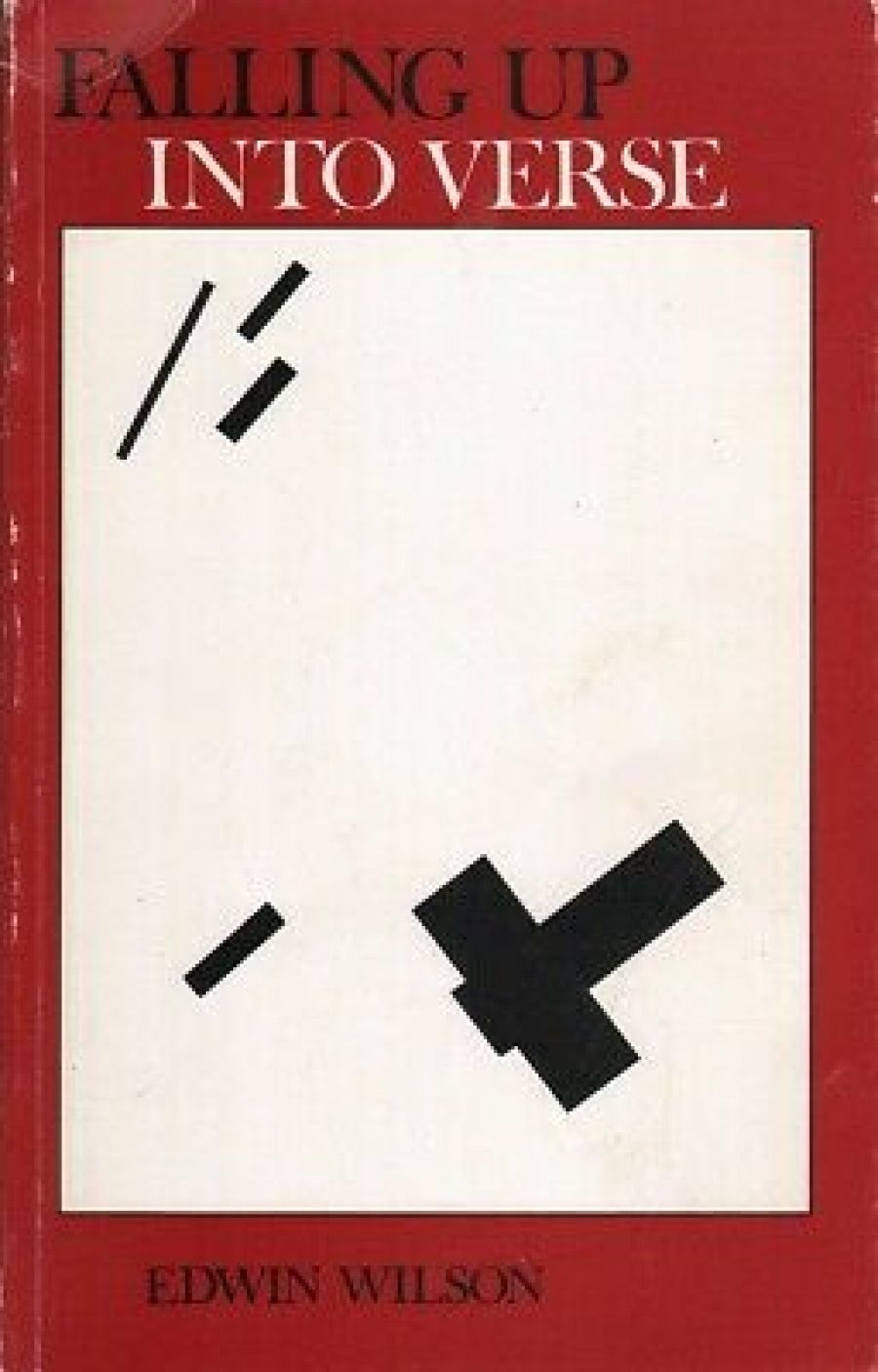
- Free Article: No
- Contents Category: Poetry
- Review Article: Yes
- Online Only: No
- Custom Highlight Text:
The prospect of reviewing a ‘Survival Manual for Live Poets’ was daunting enough, but became positively intimidating when I came across its author’s views on critics. Critics, he says, are like leeches and there’s only one way to deal with leeches: ‘take a small stick and insert it into the ... anus of the leech, pulling the leech back over the stick like a condom, impaling it, inside-out, like a shiskabab, ready to heat’.
- Book 1 Title: Falling up into Verse
- Book 1 Biblio: Woodbine Press, 138 pp, $16.95 pb
The best description of Falling up into Verse is in the author’s prefatory claim that it’s ‘not so much a text book as an idiosyncratic excursion into [the] impenetrable thicket of verse’. Unlike the many handbooks, textbooks and guides which are being produced to meet the current growth of interest in creative writing, and despite its sub-title, Falling up into Verse offers little practical advice on the development of craft or art. In a volume of 130-odd pages, it is only on page 82, and the sixth chapter, that ‘Poetic Structure and Form’ are dealt with, albeit curiously under the sub-heads ‘Difference Between Poetry and Prose’, ‘Rhyme’, ‘Rhythm’, ‘Image and Cliché’, and ‘Structure and Vogue’.
But even here there is little of real assistance to the aspiring poet, and much to mystify: ‘The problem of whether to “rhyme or not to rhyme” is one of temperament’, and ‘one of the great advantages of using rhyme and structure is that you better know when a poem is “finished”’.
The final chapter, ‘Practical Hints for Publishing Poetry’, is one of the longest sections in the book and although it does offer some useful information which is more reflective of the author’s own experience than of the general situation of poetry publishing in Australia. Most poetry editors -and many poets – would dispute the opening claim in this section that ‘it’s difficult to have verse published unless you’ve a reputation’, though it soon becomes clear that Wilson is preoccupied with publication in book form, in which case his claim has more validity.
Poets and editors would also dispute Wilson’s view of publishing in literary magazines and their role in the publishing of poetry is reflected in the advice he gives to aspiring poets. Apart from the questions begged in ‘don’t send a “working class” poem to an élitist publication like Meanjin, one wonders about the suggested first steps to publication: ‘target’, ‘subscribe’ and select a ‘good poem in the appropriate style’.
Readers who are not deterred by the analogies in the introductory section ‘What is Poetry?’ – beginning with hacking a pathway through jungle, and moving on to disease, acne, defecation, paranoia, poker machines and addictive drugs – will find an extraordinary jumble of assertions, diatribes, quotations, reminiscences and diagrams in the books first eighty pages, the ‘idiosyncratic excursion’. All of it is certainly idiosyncratic, at best confusing and at worst simplistic, silly and inimical to the cause of poetry. I must confess to finding frequent amusement in the book, but whether or not this was intended remains unclear.
Edwin Wilson may be assured that his fear that his book may have been ‘eclipsed by some alternative publication, or plagiarized and printed in another country’ is absolutely groundless. His hope that the book ‘may one day sell to the school market’ stuck fear in me and I trust that this will prove equally groundless. Falling up into Verse was published by the author’s own Woodbine Press with the aim of trying to ‘open up the path to those who may follow in the search for craftsmanship’. I’m afraid that those who may rely on this manual for survival will never emerge from the impenetrable thickets. But my personal concern is now more with small sticks than with thickets.


Comments powered by CComment